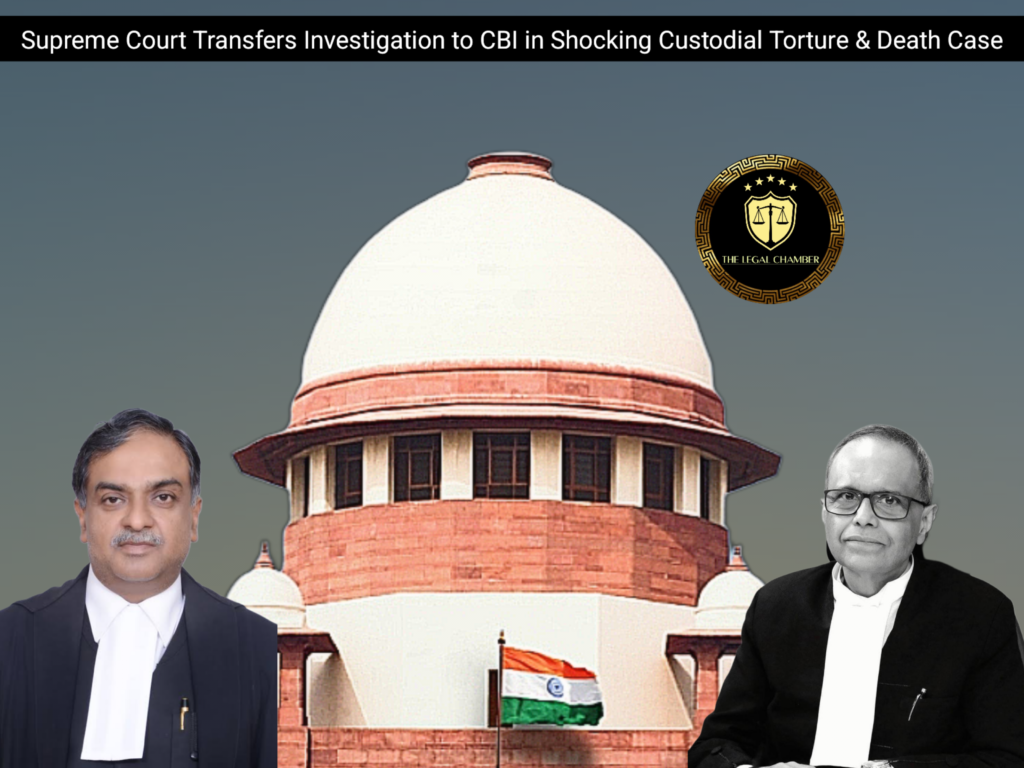
The Supreme Court transferred the investigation of a custodial death case to the CBI, citing bias in the local police probe under “nemo judex in causa sua” (no one should judge their own cause). It emphasized witness protection for the sole eyewitness, Gangaram Pardhi, and directed expedited arrests and trial, reinforcing accountability in custodial violence cases under constitutional safeguards. The judgment underscored fair investigation as a facet of Article 21.
Facts Of The Case:
The case stemmed from the custodial death of Deva Pardhi, a young man arrested by Madhya Pradesh police on 13th July 2024 during his wedding rituals in connection with a theft case (FIR No. 232/2024). Witnesses, including his uncle Gangaram Pardhi, alleged brutal torture—beatings, hanging upside down, and chili-petrol assaults—at Myana Police Station, leading to Deva’s death. The post-mortem noted severe injuries, but the medical board delayed opining on the cause, raising suspicions of police influence. Gangaram, the sole eyewitness, was illegally detained for over 24 hours before judicial remand and later implicated in multiple FIRs (e.g., FIR No. 247/2024 under BNS), allegedly to silence him. The family’s plea for an independent probe was initially dismissed by the Madhya Pradesh High Court, which only shifted Gangaram to Gwalior Central Jail citing threat perceptions. On appeal, the Supreme Court condemned the police’s “adjudging their own cause”, noting zero arrests in eight months despite magisterial inquiry findings. Highlighting violations of Article 21, the Court transferred the case to the CBI, mandated witness protection for Gangaram, and directed arrests within a month, exposing systemic failures in addressing custodial violence.
Procedural History:
The procedural history of this case reflects a turbulent judicial journey marked by systemic delays and judicial interventions. The case originated with the custodial death of Deva Pardhi on 13th July 2024, following which his family faced hurdles in even registering an FIR due to police resistance. A magisterial inquiry eventually led to the registration of FIR No. 341/2024 under Sections 105 (culpable homicide) and 115(2) (voluntary hurt) of the BNS, but the local police made no arrests. The appellants—Deva’s mother and aunt—filed Writ Petition No. 33416/2024 before the Madhya Pradesh High Court (Gwalior Bench) in December 2024, seeking transfer of investigation to an independent agency (like CBI) and bail for Gangaram Pardhi, the eyewitness entangled in retaliatory FIRs. The High Court, while acknowledging threats to Gangaram, denied bail and merely ordered his transfer to Gwalior Central Jail, refusing to intervene in the investigation. Dissatisfied, the appellants approached the Supreme Court via SLP (Crl.) No. 3450/2025, which was converted into Criminal Appeal No. [X]/2025. In its landmark 15th May 2025 judgment, the SC overturned the High Court’s approach, transferring the probe to CBI, mandating witness protection, and granting Gangaram liberty to seek bail afresh, while indicting the police for institutional bias.
READ ALSO:Can Courts Reject a Plaint for Skipping Mediation? :Supreme Court’s Strict Rule for Commercial Cases
Court Observation:
The Supreme Court made scathing observations about institutional bias and police brutality in this custodial death case. It condemned the local police’s conflict of interest, applying the maxim “nemo judex in causa sua” (no one can be judge in their own cause), noting how officers accused of torture were investigating themselves. The Bench expressed shock at the medical board’s reluctance to declare the obvious cause of death despite clear torture marks, suggesting possible coercion. It highlighted the pattern of witness intimidation through Gangaram Pardhi’s repeated implications in fresh cases as a tactic to suppress evidence. The Court underscored that fair investigation is integral to Article 21, observing that the 8-month delay in arresting accused officers reflected “institutional camaraderie overriding justice.” Importantly, it ruled that custodial violence cases demand independent probes to maintain public trust, distinguishing this as a “classic case” warranting CBI intervention. The judgment also emphasized the state’s constitutional duty to protect witnesses, directing the DGP to personally ensure Gangaram’s safety both in custody and post-bail.
Final Decision & Judgement:
The Supreme Court delivered a landmark verdict on 15th May 2025, allowing the appeal and issuing four critical directives to ensure justice in the custodial death case. First, it transferred the investigation from Madhya Pradesh Police to the CBI, mandating the registration of an RC (Regular Case) and requiring arrests of accused officers within one month. Second, it ordered the CBI to complete the probe within 90 days of arrests, emphasizing expeditious trial proceedings. Third, recognizing the life threats to eyewitness Gangaram Pardhi, the Court granted him liberty to seek fresh bail before the High Court, which was directed to consider it expeditiously while accounting for the “pattern of vindictive prosecution” against him. Crucially, the Bench ordered the Madhya Pradesh DGP and Home Secretary to personally ensure Gangaram’s protection under the witness protection scheme, whether in jail or after release. The judgment quashed the High Court’s limited relief, rebuking its failure to address investigative bias, and established that custodial violence cases demand extraordinary judicial scrutiny to uphold constitutional rights under Articles 14 and 21.
Case Details:
Case Title: Hansura Bai & Anr. vs. The State of Madhya Pradesh & Anr. Citation:(2025) INSC 711 Criminal Appeal No.: (Arising out of SLP (Crl.) No. 3450 of 2025) Date of Judgment:15th May 2025 Bench: Justice Vikram Nath & Justice Sandeep Mehta
Download The Judgement Here